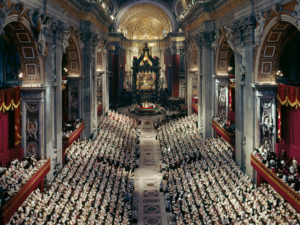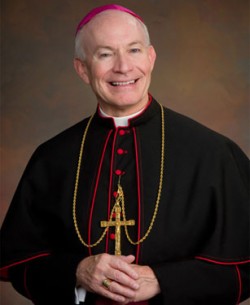Podcast: Play in new window | Download (Duration: 26:06 — 18.0MB) | Embed
Subscribe: Apple Podcasts | Spotify | Amazon Music | Android | Pandora | iHeartRadio | JioSaavn | Podchaser | Gaana | Podcast Index | Email | TuneIn | Deezer | Anghami | RSS | More

Episode 21 Vatican II – Dei Verbum pt. 2 – Why it Matters: An Exploration of Faith with Archbishop George Lucas
In this episode with Archbishop Lucas, we continue our conversation on the Dogmatic Constitution on Divine Revelation
Dei verbum, the Second Vatican Council’s Dogmatic Constitution on Divine Revelation, was promulgated by Pope Paul VI on 18 November 1965, following approval by the assembled bishops by a vote of 2,344 to 6. The phrase “Dei verbum” is Latin for “Word of God” and is taken from the first line of the document, as is customary for titles of major Catholic documents.
An excerpt from Dei Verbum:
12. However, since God speaks in Sacred Scripture through men in human fashion, (6) the interpreter of Sacred Scripture, in order to see clearly what God wanted to communicate to us, should carefully investigate what meaning the sacred writers really intended, and what God wanted to manifest by means of their words.
To search out the intention of the sacred writers, attention should be given, among other things, to “literary forms.” For truth is set forth and expressed differently in texts which are variously historical, prophetic, poetic, or of other forms of discourse. The interpreter must investigate what meaning the sacred writer intended to express and actually expressed in particular circumstances by using contemporary literary forms in accordance with the situation of his own time and culture. (7) For the correct understanding of what the sacred author wanted to assert, due attention must be paid to the customary and characteristic styles of feeling, speaking and narrating which prevailed at the time of the sacred writer, and to the patterns men normally employed at that period in their everyday dealings with one another. (8)
But, since Holy Scripture must be read and interpreted in the sacred spirit in which it was written, (9) no less serious attention must be given to the content and unity of the whole of Scripture if the meaning of the sacred texts is to be correctly worked out. The living tradition of the whole Church must be taken into account along with the harmony which exists between elements of the faith. It is the task of exegetes to work according to these rules toward a better understanding and explanation of the meaning of Sacred Scripture, so that through preparatory study the judgment of the Church may mature. For all of what has been said about the way of interpreting Scripture is subject finally to the judgment of the Church, which carries out the divine commission and ministry of guarding and interpreting the word of God. (10)

For the documents of Vatican II visit here
For more episodes in this series visit the


